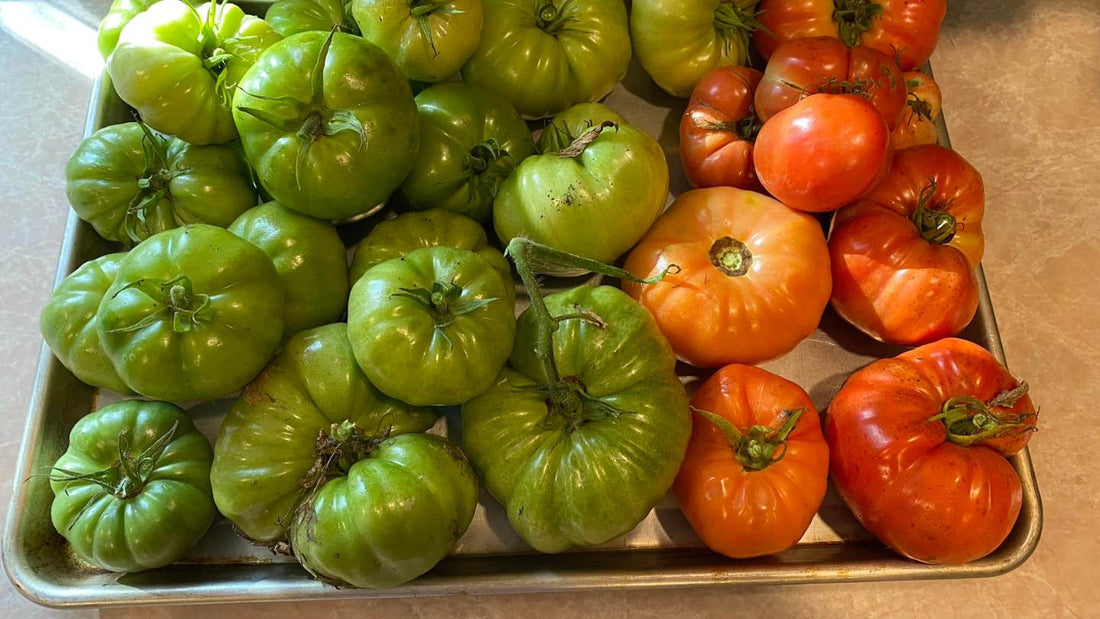Imagine stepping into your greenhouse nursery, plucking tomatoes, fragrant cilantro, and onions, then whipping up the freshest salsa you've ever tasted.
Sounds mouthwatering? Growing a "salsa garden" in your greenhouse isn't just possible—it's a flavor-packed adventure waiting to happen.
Ready to transform your greenhouse into a salsa-making haven? This guide outlines the essential techniques for growing these salsa staples together in a greenhouse.
Let’s dive in!

1. Select Your Salsa Garden Ingredients
First, you’ll need to select what summer salsa ingredients you’ll plant. Here are some essentials:
- Tomatoes are the foundation of any exceptional salsa. For optimal flavor, consider varieties such as Roma, San Marzano, or Cherry tomatoes.
- Onions: Incorporate zest with varieties like Red onions, White onions, or milder options such as Vidalia.
- Cilantro: This herb contributes its distinctive, fresh essence to your salsa. Select slow-bolting varieties for an extended harvest.
- Additional Options: Enhance heat levels with jalapeños or bell peppers, or introduce garlic for added complexity!

2. Establish an Ideal Greenhouse Environment
Now, let's create the optimal conditions for your salsa garden to flourish:
Temperature Regulation
Maintain a daytime range of 70°F to 80°F (21°C to 27°C). Tomatoes and peppers thrive in warmth, while cilantro and onions prefer slightly cooler temperatures.
Consider creating microclimates within your greenhouse by using shade cloth or positioning heat-loving plants in the sunniest spots to accommodate these varying needs.

Humidity Control
To prevent fungal issues, maintain humidity around 50-60%. Use proper ventilation and consider a dehumidifier if necessary.
Humidity levels can fluctuate throughout the day, so monitoring and adjusting as needed, especially during watering or early morning, can help maintain optimal conditions!
Light Requirements
Ensure your plants receive 6-8 hours of sunlight daily. Tomatoes and peppers are heliophilic, while cilantro can tolerate partial shade.
Utilize greenhouse grow lights to supplement natural light, particularly during shorter winter days.
3. Soil and Nutrition: The Fundamental Elements
Exceptional salsa begins with proper soil preparation. Here's how to provide your plants with the nutrients they require:
- Combine a well-draining soil mixture with compost, perlite, and vermiculite.
- Aim for a pH between 6.0 and 7.0 to accommodate all plants.
- Nourish your tomatoes and peppers with a balanced, organic fertilizer every 2-3 weeks.
- Apply moderate nitrogen to onions to encourage bulb development. Cilantro is less demanding—a single application of compost at planting time is typically sufficient.
4. Irrigation Strategies
Maintaining appropriate hydration in your salsa garden is crucial, but each plant has unique requirements:
- Tomatoes and peppers prefer deep, infrequent watering. Apply water at the base to avoid wetting the foliage.
- Onions require consistent moisture but are averse to waterlogged soil. Water when the top inch of soil feels dry.
- Cilantro prefers evenly moist soil. Exercise caution to avoid overwatering, as it can lead to root rot.
Consider installing a drip irrigation system for precise watering and to keep foliage dry, reducing the risk of diseases!

5. Companion Planting: The Salsa Garden Arrangement
This is where horticultural strategy comes into play. Organize your salsa garden for optimal symbiosis with companion planting:
- Position tomatoes and onions in proximity—they make excellent companions! Onions help deter pests that are attracted to tomatoes.
- Situate cilantro at the periphery of your tomato greenhouse. While they can coexist, cilantro prefers cooler temperatures.
- Basil is also an ideal neighbor for tomatoes and can be a flavorful addition to your salsa recipe!
6. Harvesting Your Salsa Bounty
The highly anticipated moment has arrived—harvest time!
- Tomatoes: Harvest when fully colored and slightly yielding to touch.
- Onions: Collect when the tops begin to fall over and desiccate.
- Cilantro: Regularly trim leaves to encourage bushier growth. Harvest entire plants before they bolt.
Expert Tip: Stagger your plantings, especially for cilantro, to ensure a continuous harvest throughout the growing season.

Enjoy Your Homegrown Salsa
You've cultivated all the ingredients for a delicious homemade salsa. Now, it's time to savor the fruits (and vegetables) of your labor.
These greenhouse techniques will help you create the freshest, most flavorful salsa!
Are you ready to embark on your salsa-growing adventure? Look at our DIY greenhouse kits or explore our growing guides to create the ideal environment for your salsa garden.
Why Nova Greenhouses?
- We handpick high-quality greenhouses from the best brands in the world.
- Our team works hard to find extraordinary backyard greenhouses at reasonable price points.
- We exclusively source premium products made from the finest materials.
- Our team tests every greenhouse to guarantee strength & durability.
- We have a vast shipping network that reaches every corner of Canada & the USA.
- Our top-rated customer care team is available 7-days a week to answer any questions.

